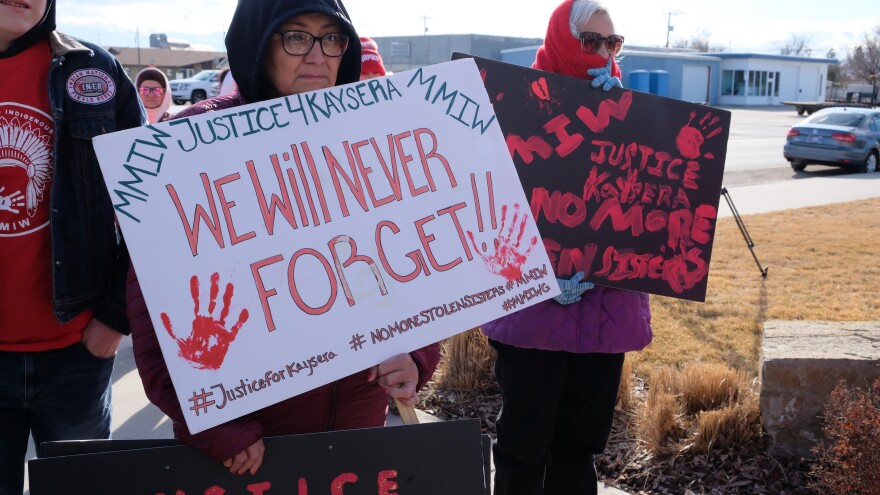Families in southeast Montana are demanding law enforcement review all cases of missing and murdered indigenous people in Big Horn, Rosebud, and Yellowstone Counties, to uncover possible revelations about events leading up to known deaths and improve future investigations.
Rally organizers with Native American rights nonprofit Sovereign Bodies Institute read the names of the missing and murdered in front of the Big Horn County courthouse in Hardin, where a group of about 50 gathered Monday, Feb. 24.
Person after person takes the microphone and say they feel ignored and unheard. That includes Geralyn Bulltail.
The body of her daughter, 18-year-old Kaysera Stops Pretty Places, was found in a Hardin backyard last year. Her cause of death is still unknown.
“This Big Horn County, they didn’t call back, they didn’t respond, they didn’t do nothing,” says Bulltail.
Sovereign Bodies Institute this week helped families addressa letterto county officials, legislators and state and federal agencies detailing changes they say would be steps towards bringing justice to victims and their families.
Executive Director Annita Lucchesi says they’re asking for an interagency review of all missing persons cases, homicides, suspicious deaths and cases where the cause of death was classified as undetermined, exposure or natural causes.
“We’ve seen over and over and over again that the county sheriff and coroners, they are negligent and they’re refusing to act on these cases. They need to be held accountable for it and the best people to do that are state and federal law enforcement,” says Lucchessi.
Sovereign Bodies Institute writes that the majority of the families who signed the letter are still waiting on resolutions to their loved ones’ cases.
In a lower level of the courthouse building, Sheriff Lawrence Big Hair says it can be taxing to hear so much criticism, especially when he says his staff is pulling long hours working on open cases and meanwhile waiting on subpoenas from the county attorney’s office.
“They want to point fingers at the sheriff’s office for not doing a proper investigation or whatever, but it seems like that because we don’t have the cooperation from that other office,” says Big Hair. “It’ll help us, but why don’t they get on that office for not helping us with the subpoenas that we’re asking for?”
Big Horn County Attorney Jay Harris emailed a statement saying that a subpoena from January was held up because the sheriff’s office didn’t provide material needed for the court to issue an investigative subpoena.
Sovereign Bodies Institute has criticized jurisdictional barriers in the past.
This week, Lucchesi also took issue with a state law that allows county coroners, an elected position that requires a GED and a basic coroner course, to decide if a postmortem examination by the state medical examiner is needed as part of an investigation.
“It really shouldn’t be that way,” she says. The person that decides if a person gets a death investigation and what their cause and manner of death should be, should be someone with medical training.”
Sovereign Bodies Institute’s letter requests an inte-agency review of cases where the death is, in their words, "wrongfully classified" as natural causes like exposure or hypothermia.
Terry Bullis of Bullis Mortuary in Hardin is the Big Horn County Coroner. He says his role is to determine when, where and how a person died and whether death resulted from criminal means.
“If I’m not able to make a judgement based upon the information, I usually refer to the state medical examiner for assistance,” he says.
In 2017, Big Horn County sent bodies for autopsies in almost 16 percent of deaths, according to state data. That’s one of the highest rates for counties across the state.
Families of a recent rash of young girls declared dead of exposure say they’ve observed bruising and other markings on the girls' bodies that they’ve seen as signs of violence.
State medical examiner Robert Kurtzman is one of four forensic pathologists who can make cause of death determinations in the state. He says the body goes through changes the families could interpret as evidence of foul play.
He says the coroner is often tasked with communicating that process to families, a possible weak point that can make a situation much worse.
“If the coroner is working with the family, the coroner may or may not have the same type of expertise with regard to explaining sometimes complex medical questions,” says Kurtzman. “And so, it becomes a matter of, I’ll say, the limitations of the system.”
He says failure to communicate in a transparent and clear way can build distrust overtime.
Many ralliers Monday expressed profound distrust of local authorities.
Grace Bulltail, the aunt of the late Kaysera Stops Pretty Places, called for ralliers to take action.
"You want change here in Big Horn, everyone that’s a registered voter,” she said. “Get into that booth and start making it.”
Copyright 2020 Yellowstone Public Radio


